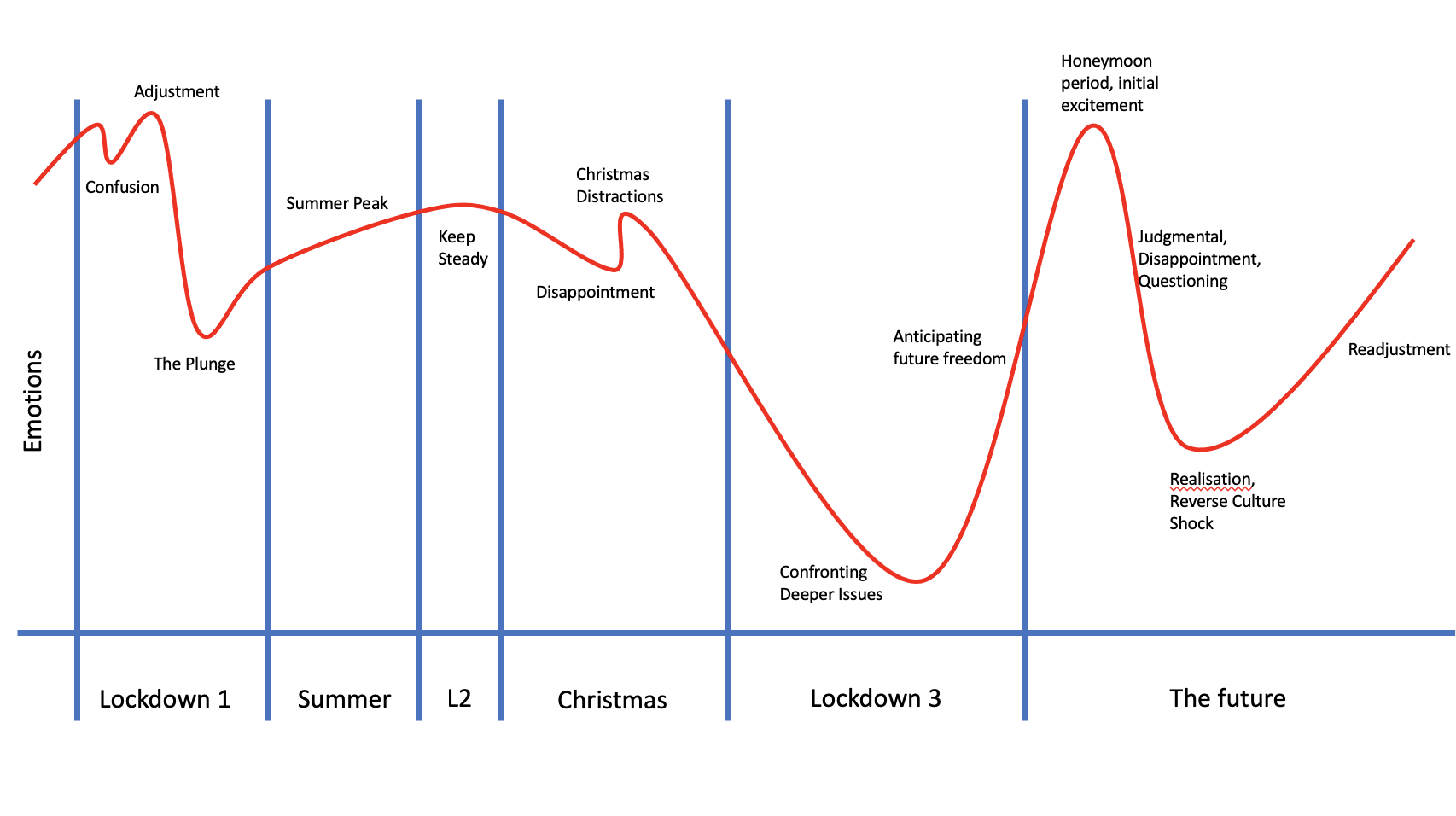Why you need to be ready for Reverse Culture Shock as we exit lockdown
Whilst the idea of culture shock – the psychological, emotional and cultural impact of entering a new culture – is well known, the idea that when you re-enter your home culture there can be a “reverse” culture shock is less well understood.
It has become apparent to me, however, that it is a useful construct to help us and our organisations think through what will happen as lockdown from COVID-19 is gradually released and we begin to re-enter into an environment with which we have been more familiar – albeit changed.
My first experience of reverse culture shock was on returning from my Gap year in 1986 from Taiwan. At age 21 the experience of culture shock had been profound, but the reverse aspect of it knocked me for six. I remember the shock of seeing grass verges and green hills once again and entering the supermarket to be overwhelmed with the choice of crisp flavours that assaulted me. I remember the joy of the first moments of re-uniting with family, followed by the disappointment, judgement and realisation that I had changed and my home had changed.
My other experience was taking 12 business people on a 10 day camping trip to Mozambique – camping under the stars in a rural village where you never knew what was for breakfast or dinner and where your safety was always your paramount concern. As we travelled back to the UK we allowed the business people 1 night in a 3 star hotel in Maputo before flying back. As people came down to breakfast the following morning they started asking why there wasn’t any apple juice or tomato juice for breakfast – because that is what you would expect from a Holiday Inn. The day before they would have been grateful for anything, but now their expectations were raised of what the new normal should be and they were disappointed.
We’ve been on a journey
What happens when you experience culture shock? Your routines are changed. Your relationships are changed. Things that you took for granted are no longer possible. In our cases over the last 12 months, this has been true at many levels. Our work and home routines have changed. We’ve lost physical contact with loved ones and work colleagues. We’ve become used to a new way of life, a new way of doing things.
Craig Storti, says the following: “The essence of home can be described in three key elements: familiar places, familiar people and routines, and predictable patterns of interaction.” These three elements associate the feelings of security, understanding, trust, safety and belonging. During this pandemic we may not have been to a foreign country but our homes have been changed forever and insecurity, uncertainty and anxiety have become our norm.
Re-entry will be hard – what we can learn from reverse culture shock
The notion that lockdown will lift and we will all be straight back to normal is fanciful in the least. Regardless of the speed at which lockdown lifts and the fact that space, face, and washing hands will be part of the norm for many years, reverse culture shock would teach us that:
- There will be a honeymoon period where we will all be delighted to do things together again, party and eat out, mix, go to Church and go back to the office.
- That honeymoon period will end and there will be moments of disillusionment as we realise that i) we have changed and ii) everyone else has changed
- There will then be a period of re-adjustment as we question our purpose, think through what we want to be doing with the rest of our lives and make choices about old habits that we want back and those that are gone for good.
- We will have a myriad of choices to make about how we want to build back better.
How can we help people re-adjust through reverse culture shock?
- Recognise that everyone will go through reverse culture shock at different speeds. Our experiences have been different and our re-entry will be different. Different for homeschoolers, home-workers, key workers, retired people and those who have lost loved ones.
- Allow for different personality types. Those who will want to get on immediately with re-building and partying and those who need time to process what has happened. Watch out particularly for those who will become marginalised as part of this processing.
- Expect a period of re-adjustment and a physchological, emotional and cultural response to the rollercoaster of emotions we will experience – from honeymoon periods of joy to depths of despair. Watch out particularly for the temptation to become critical of the new norm.
- Facilitate people being able to reflect on their journey, tell their story and wrestle with meaning and purpose.
The following diagram is really helpful in graphically showing the phases we may have been through and will go through.

What does your emotional rollercoaster graph look like? We are all different, but there are some commonalities that can help us reflect.
Beware Reverse-Culture Shock and prepare yourself and your team for it.
